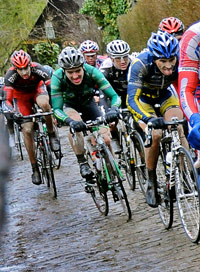
I don’t hide that fact that I think the spring classics are the best bike racing the season has to offer. Sure, in terms of complexity, drama and sheer scale they can’t match the sweeping scope of the Grand Tours, but then again, how many people do you find who hold up Moby Dick as a model of excellence in prose styling? While the Tour may mark the season’s traditional high point, the best racing you’ll see all year comes over the next few months.
Outside the all-or-nothing attacks of fresh legs on storied, unpredictable courses that (usually) encourage and reward aggression, the classics are also critical because they set the backstory over which the remainder of the season plays out. McEwen’s headbutt as Boonen sprinted to a win at the ’05 Tour (not to mention the ensuing ad) was built on the angst of Quick.Step’s dominant spring campaign.
And who can forget 2010 when “motorized doping” became the buzzword and the UCI trotted out bike scanners to randomly screen for the supposed secret motors at the Tour de France? We can all thank Fabian Cancellara’s sensational spring run for that.
The classics—especially the early classics—are also fun because of the welcome uncertainty that surrounds them. Recent years have seen one rider—Cancellara in 2010 and Philipe Gilbert in 2011—reach peak condition and then ride away from races with such mechanical efficiency that the outcome of each successive event seemed almost predetermined. It’s nice to have that feeling of not knowing how things will shake out, at least for a few weeks.
This year’s season is all the more open thanks to some notable absences. Yoann Offredo, a frequently electric—if thus far unsuccessful—animator in the spring races will be taking some time off due to blown whereabouts information. It’s a tough thing to keep up on documenting your whereabouts three months in advance, don’t get me wrong. But the rules of the game are well-established, and at 24, Offredo fortunately has a few more years to figure them out.
On the other side of the absence coin, we have team RadioShack Leopard Trek, which is voluntarily holding themselves out of this weekend’s opening classics under the auspices of careful management and risk avoidance. While Bruyneel has something of a point—KBK and Het Nieuwsblad are over a month removed from the biggest prizes on the classics calendar—it’s still not a tack taken by many major teams.
I’d guess this is because a full-tilt preview of the climbs and cobbles that feature in so many big spring races is hard to create outside of a sanctioned event, while the very act of holding position in a pack over such terrain probably requires as much practice as a rider can get. Then, of course, there’s the chance that one of your riders might actually win. While it may not have the prestige of Flanders of Roubaix, with nothing else to compete on the race calendar, a win this weekend might be just about equal in terms of publicity.
Nice piece! Watching just this weekend’s races reminds me why these are often so interesting to watch. Looking forward to heading north to see my first cobbled classic, Paris-Roubaix in a few weeks. I still wonder why so many regular bike purchasers opt for bikes optimized for climbing Alpe d’Huez when their regular cycling is more like the spring classics?